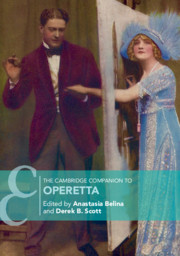Book contents
- The Cambridge Companion to Operetta
- Cambridge Companions to Music
- The Cambridge Companion to Operetta
- Copyright page
- Contents
- Illustrations
- Tables
- Music Examples
- Notes on Contributors
- Chronology, 1855–1950
- Introduction
- Part I Early Centres of Operetta
- Part II The Global Expansion of Operetta
- Part III Operetta since 1900
- 12 The Operetta Factory: Production Systems of Silver-Age Vienna
- 13 Berlin Operetta
- 14 Operetta in Italy
- 15 Operetta in Warsaw
- 16 British Operetta after Gilbert and Sullivan
- 17 Operetta During the Nazi Regime
- 18 Operetta Films
- 19 Australian Director Barrie Kosky on the Subversiveness of a Predominantly Jewish Genre: An Interview by Ulrich Lenz
- Select Bibliography
- Index
- References
14 - Operetta in Italy
from Part III - Operetta since 1900
Published online by Cambridge University Press: 14 November 2019
- The Cambridge Companion to Operetta
- Cambridge Companions to Music
- The Cambridge Companion to Operetta
- Copyright page
- Contents
- Illustrations
- Tables
- Music Examples
- Notes on Contributors
- Chronology, 1855–1950
- Introduction
- Part I Early Centres of Operetta
- Part II The Global Expansion of Operetta
- Part III Operetta since 1900
- 12 The Operetta Factory: Production Systems of Silver-Age Vienna
- 13 Berlin Operetta
- 14 Operetta in Italy
- 15 Operetta in Warsaw
- 16 British Operetta after Gilbert and Sullivan
- 17 Operetta During the Nazi Regime
- 18 Operetta Films
- 19 Australian Director Barrie Kosky on the Subversiveness of a Predominantly Jewish Genre: An Interview by Ulrich Lenz
- Select Bibliography
- Index
- References
Summary
The history of operetta in Italy is inextricably entangled with discourses about the status of Italian opera and the formation of an Italian national identity. In the 1860s, it was Offenbach, Hervé and Lecocq that conquered the Italian stages, then, later, the ‘Viennese’ imports of Suppé, Strauss Jr and Lehár. Italian operettas based on parodies of foreign works and combining elements of dialect and couleur locale flourished at this time but struggled to undermine both the foreign monopoly and the time-honoured tradition of opera buffa. The relationship between operetta and Italian opera – not only buffa but also seria – was central also to critical discourses about the rise of the Italian bourgeois, becoming closely intertwined with questions on the position of musical theatre between entertainment and art. Inevitably, discussions of operetta also took strong nationalistic undertones in a country that was struggling to find a unifying national identity and that recognized operetta as a foreign import that could contaminate opera or illegitimately undermine its primacy on Italian stages. The extraordinary success of La vedova allegra in Milan in 1907 and the growing political tensions between Italy and Austria-Hungary in ensuing years sparked new interest in the creation of a national operetta.
- Type
- Chapter
- Information
- The Cambridge Companion to Operetta , pp. 220 - 231Publisher: Cambridge University PressPrint publication year: 2019



